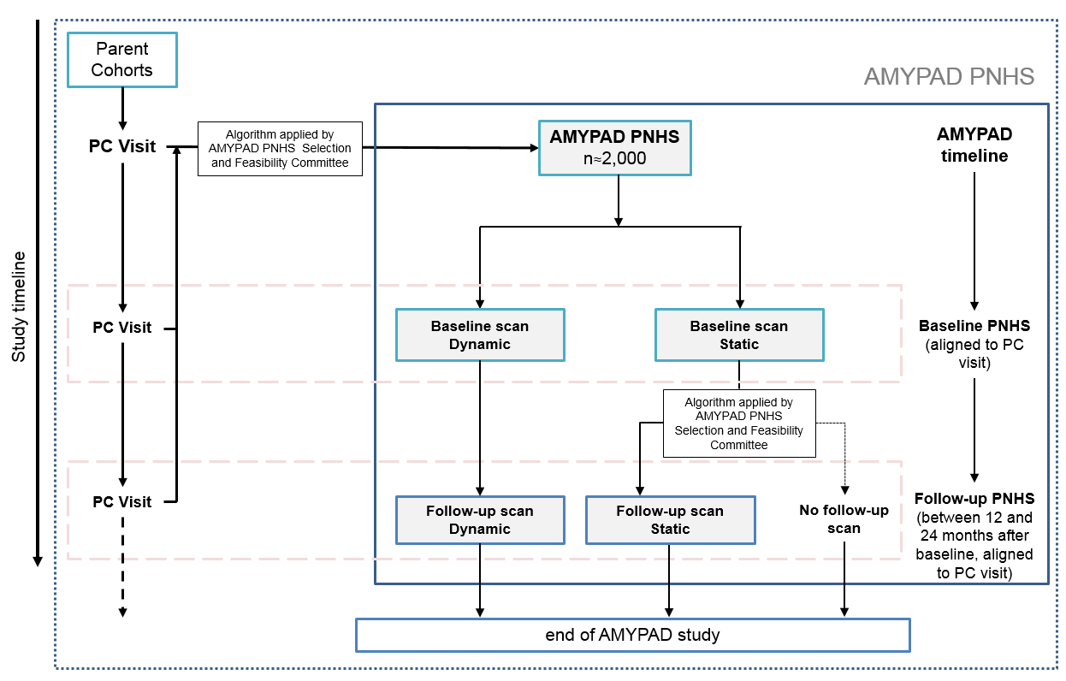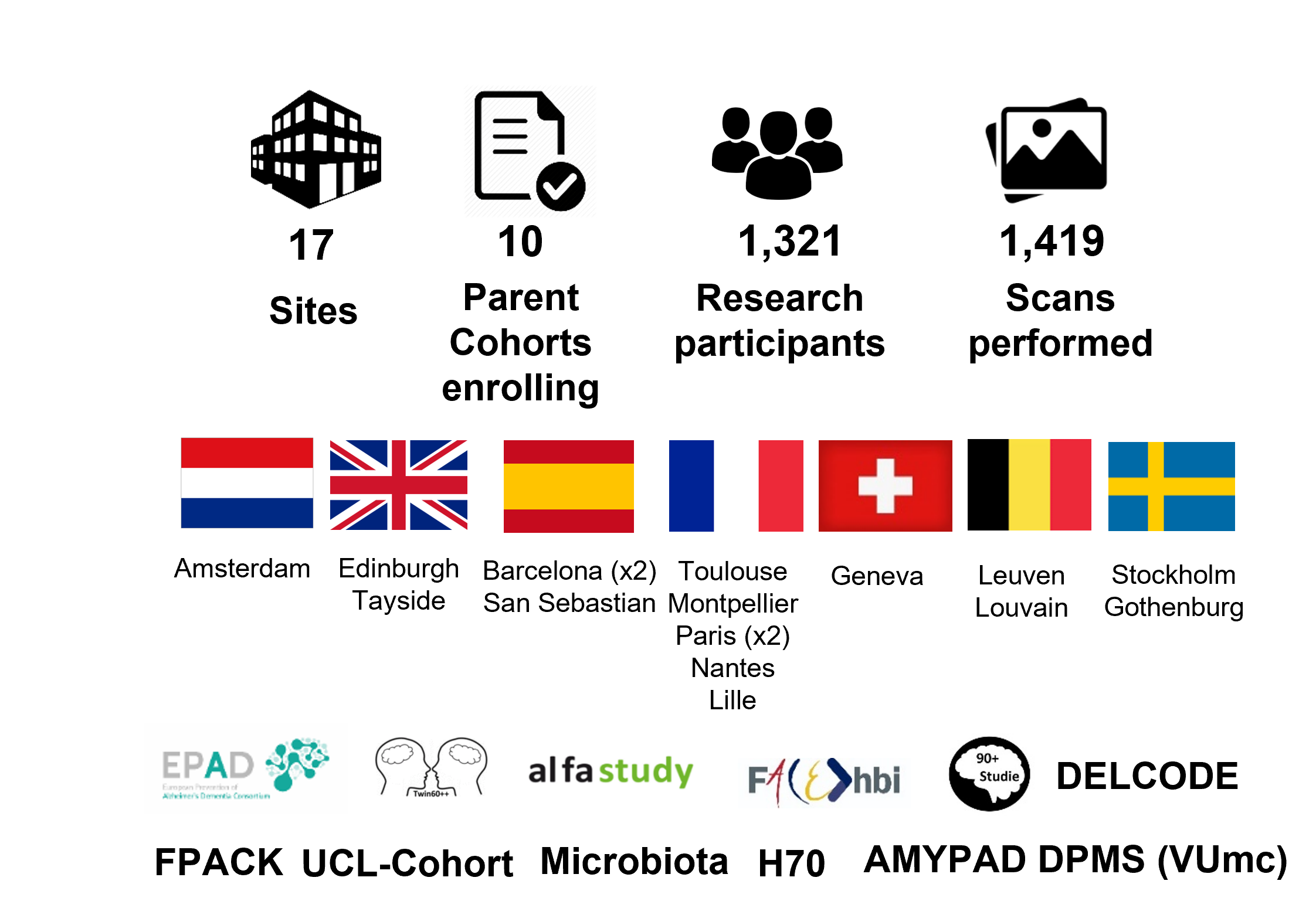The primary objective of the AMYPAD Prognostic and Natural History Study (PNHS) was to evaluate the value of quantitative PET amyloid imaging measures for predicting progression within an Alzheimer's disease risk probability spectrum based on quantitative PET amyloid imaging measures, with or without other biomarkers. Through an intimate collaboration with EPAD and other non-EPAD cohorts, we leveraged a Europe-wide network, with all the necessary training and instrumentation to study the earliest stages on the path towards Alzheimer’s disease in a longitudinal fashion.
- Sponsor: VUmc
- EudraCT NUMBER: 2018-002277-22
- A variety of parent cohorts (EPAD, EMIF-AD (Twin 60++ or 90+), ALFA+, FACEHBI, FPACK, UCL-Cohort, Microbiota, H70, DELCODE, AMYPAD DPMS(VUmc))
- 1,320 participants recruited (recruitment ended on 30 April 2022)
- Two tracers
- Dynamics scans as preference
- Longitudinal PET in 50%
- Download the study design paper published in the journal Alzheimer's & Dementia here
- EPAD-LCS
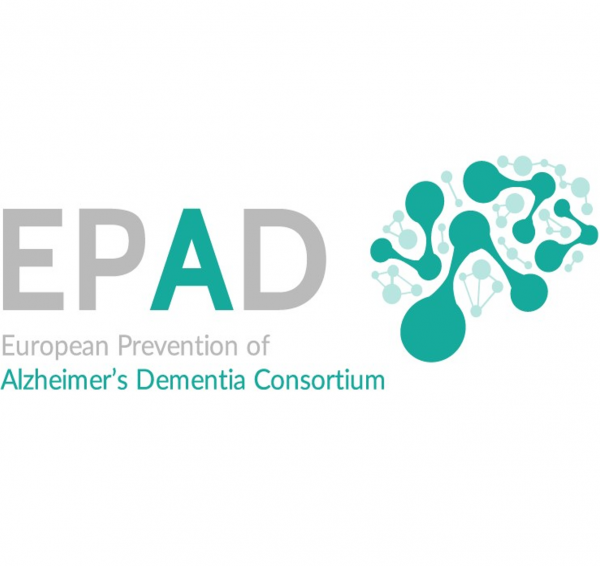 In 2016, the European Prevention of Alzheimer’s dementia (EPAD) project began a longitudinal cohort study (LCS) that screened more than 2,000 participants to collect a wide range of cognitive, clinical, neuroimaging and biomarker data to help further the understanding of the early stages of Alzheimer’s disease. From these 2,000 participants, EPAD followed up with 1,225 after one year, 421 after two years and 121 after three years before funding from the Innovative Medicine Initiative (IMI) ceased.
In 2016, the European Prevention of Alzheimer’s dementia (EPAD) project began a longitudinal cohort study (LCS) that screened more than 2,000 participants to collect a wide range of cognitive, clinical, neuroimaging and biomarker data to help further the understanding of the early stages of Alzheimer’s disease. From these 2,000 participants, EPAD followed up with 1,225 after one year, 421 after two years and 121 after three years before funding from the Innovative Medicine Initiative (IMI) ceased.
Principal Investigator: Craig Ritchie
“The European Prevention of Alzheimer’s Dementia (EPAD) Longitudinal Cohort Study: Baseline Data Release V500.0” here.
For more information, visit the EPAD website here or check out the key papers below:“European Prevention of Alzheimer’s Dementia Longitudinal Cohort Study (EPAD LCS): study protocol” here.
- EMIF-AD 60++
 The Pre-clinAD EMIF-AD cohort in Amsterdam (Netherlands) is part of the European Medical Information Framework for AD (EMIF-AD) project, which aims to facilitate the development of treatment for Alzheimer’s disease in people without dementia.
The Pre-clinAD EMIF-AD cohort in Amsterdam (Netherlands) is part of the European Medical Information Framework for AD (EMIF-AD) project, which aims to facilitate the development of treatment for Alzheimer’s disease in people without dementia.Within the PreclinAD EMIF-AD study, cognitively normal elderly individuals were recruited from the Netherlands Twin Register (NTR) in Amsterdam, which aimed to validate existing and discover new markers for amyloid pathology in cognitively normal elderly individuals; identify risk factors for amyloid pathology; identify prognostic markers for cognitive decline in cognitively normal subjects with amyloid pathology and determine the contribution of genetic and environmental influences on these markers.
Principal Investigator: Pieter Jelle Visser
For more information, visit the EMIF website here, visit the AlzheimerCentrum Amsterdam website here or check out the paper “The EMIF-AD PreclinAD study: study design and baseline cohort overview” here.
- - EMIF-AD 90+
 The EMIF-AD 90+ study aimed to identify factors associated with resilience to cognitive impairment in the oldest-old. The study was conducted at the Amsterdam University Medical Center (Netherlands) and at the University of Manchester (UK). At baseline, neuropsychological and clinical data (vascular comorbidities, mood, sleep, physical performance, genetic factors) were collected from 129 participants (n=84 with normal cognition and n=38 with cognitive deficits). Regarding imaging measures: baseline MRI, Amyloid-PET and MEG have been collected. The study was part of the Innovative Medicine Initiative (IMI) European Medical Information Framework for AD (EMIF-AD) project. Only the data of the subjects with normal cognition from Amsterdam will be included in the AMYPAD study.
The EMIF-AD 90+ study aimed to identify factors associated with resilience to cognitive impairment in the oldest-old. The study was conducted at the Amsterdam University Medical Center (Netherlands) and at the University of Manchester (UK). At baseline, neuropsychological and clinical data (vascular comorbidities, mood, sleep, physical performance, genetic factors) were collected from 129 participants (n=84 with normal cognition and n=38 with cognitive deficits). Regarding imaging measures: baseline MRI, Amyloid-PET and MEG have been collected. The study was part of the Innovative Medicine Initiative (IMI) European Medical Information Framework for AD (EMIF-AD) project. Only the data of the subjects with normal cognition from Amsterdam will be included in the AMYPAD study.Principal Investigators: Pieter Jelle Visser & Stephan Carter
For more information, visit the Amsterdam University Medical Center website here or check out the paper “Resilience to cognitive impairment in the oldest-old: design of the EMIF-AD 90+ study” here.
- -
ALFA+
 Alfa + (for Alzheimer and Families) is a cohort, prospective and observational study for the early identification of biomarkers of Alzheimer's disease in 500 cognitively healthy people who are descendants of people with Alzheimer’s disease. The cohort is made up of participants who come from the Alfa Study, launched in 2013, thanks to the support of "la Caixa" Foundation, who, periodically, go to Barcelonaβeta Brain Research Center (BBRC, Barcelona, Spain) to perform the different tests that it contemplates.
Alfa + (for Alzheimer and Families) is a cohort, prospective and observational study for the early identification of biomarkers of Alzheimer's disease in 500 cognitively healthy people who are descendants of people with Alzheimer’s disease. The cohort is made up of participants who come from the Alfa Study, launched in 2013, thanks to the support of "la Caixa" Foundation, who, periodically, go to Barcelonaβeta Brain Research Center (BBRC, Barcelona, Spain) to perform the different tests that it contemplates.Alfa + includes two sessions of magnetic resonance and, in addition, in an additional study, a Positron Emission Tomography (PET) of 18F-Flutemetamol and a PET of 18F-Fludeoxyglucose, which are performed in the facilities from the Hospital Clínic. In addition to these neuroimaging tests, the study includes the extraction of blood samples, cerebrospinal fluid and urine, the collection of medical records, and the performance of nursing tests (height, weight, blood pressure), cognition test and questionnaires. of life habits.
Coordinator: Karine Fauria
For more information, visit the BBRC website here or check out the key papers below:
“The ALFA project: A research platform to identify early pathophysiological features of Alzheimer's disease” here.
“ALFA+: A cohort study to understand and model the preclinical stage of Alzheimer’s disease” here.
- - FACEHBI
 Fundació ACE Healthy Brain Initiative (FACEHBI) is a research study that began in December 2014 at Ace Alzheimer Center Barcelona (Spain). It aims to characterise 200 individuals with Subjective Cognitive Decline from a clinical and biological perspective. The participants in this study are healthy individuals over 50 years old who present memory complaints that cannot be detected with validated neuropsychological tests. FACEHBI is an observational study where participants are followed up annually and carry out several tests including comprehensive neurological and neuropsychological exams, a magnetic resonance of the brain, a PE-amyloid scan, a lumbar puncture to quantify cerebrospinal fluid amyloid and tau levels, and blood test, among others. Currently, participants are undergoing visit 6 of the study.
Fundació ACE Healthy Brain Initiative (FACEHBI) is a research study that began in December 2014 at Ace Alzheimer Center Barcelona (Spain). It aims to characterise 200 individuals with Subjective Cognitive Decline from a clinical and biological perspective. The participants in this study are healthy individuals over 50 years old who present memory complaints that cannot be detected with validated neuropsychological tests. FACEHBI is an observational study where participants are followed up annually and carry out several tests including comprehensive neurological and neuropsychological exams, a magnetic resonance of the brain, a PE-amyloid scan, a lumbar puncture to quantify cerebrospinal fluid amyloid and tau levels, and blood test, among others. Currently, participants are undergoing visit 6 of the study.Principal Investigator: Mercè Boada
For more information, visit the Fundació ACE website here or check out the paper “FACEHBI: A Prospective Study of Risk Factors, Biomarkers and Cognition in a Cohort of Individuals with Subjective Cognitive Decline. Study Rationale and Research Protocols” here.
- - FPACK
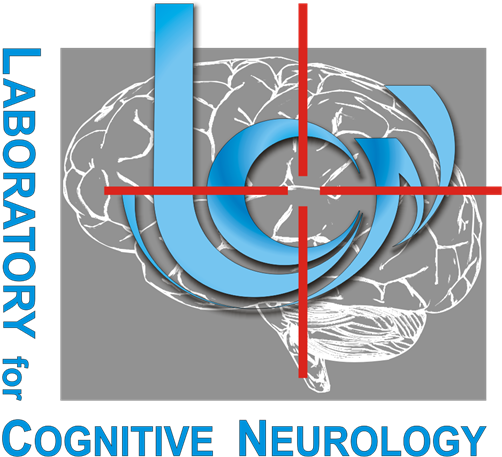 The laboratory for Cognitive Neurology at UZ/KU Leuven (Belgium) has formed a cohort to investigate the changes occurring in the brain in the early stages of Alzheimer’s disease, named F-PACK: the Flemish Prevent Alzheimer’s disease Cohort KU Leuven. Individuals between 50 and 80 years of age were recruited such that half were carriers of the APOE ε4 allele and the BDNF 66met allele, as these two genetic polymorphisms increase the risk for Alzheimer’s disease and cognitive decline. There are currently 231 participants enrolled, from successive waves, starting from 2009. Individuals who participate in F-PACK were cognitively healthy at recruitment and have performed cognitive testing, as well as received amyloid and tau PET scans. Study participants are followed for 10 years with two-yearly cognitive assessments. These elements are used to aid the understanding of the early disease stages in which individuals are cognitively healthy but at risk of developing the disease.
The laboratory for Cognitive Neurology at UZ/KU Leuven (Belgium) has formed a cohort to investigate the changes occurring in the brain in the early stages of Alzheimer’s disease, named F-PACK: the Flemish Prevent Alzheimer’s disease Cohort KU Leuven. Individuals between 50 and 80 years of age were recruited such that half were carriers of the APOE ε4 allele and the BDNF 66met allele, as these two genetic polymorphisms increase the risk for Alzheimer’s disease and cognitive decline. There are currently 231 participants enrolled, from successive waves, starting from 2009. Individuals who participate in F-PACK were cognitively healthy at recruitment and have performed cognitive testing, as well as received amyloid and tau PET scans. Study participants are followed for 10 years with two-yearly cognitive assessments. These elements are used to aid the understanding of the early disease stages in which individuals are cognitively healthy but at risk of developing the disease.Principal Investigator: Rik Vandenberghe
For more information, visit the website of the laboratory here or check out the key papers below:
“Comparison of ELISA- and SIMOA-based quantification of plasma Aβ ratios for early detection of cerebral amyloidosis” here.
“Baseline cognition is the best predictor of 4-year cognitive change in cognitively intact older adults” here.
- - UCL-Cohort
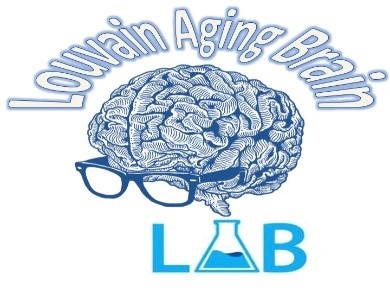 The UCL-2010-412 is one of a few studies conducted by the Louvain Aging Brain lab (Louvain, Belgium). The Louvain Aging Brain LAB studies the consequences of normal and pathological aging using multimodal imaging, biological samples, and detailed cognitive testing that the team follows over time in people without dementia attending the Memory Clinic of Saint-Luc University Hospital (Brussels, Belgium) and in clinically normal older adults. The UCL-2010-412 study has enrolled more than 150 participants between March 2011 and December 2018 and acquired amyloid-PET using F18-Flutemetamol, FDG-PET, 3T-MRI, and a neuropsychological evaluation that has been repeated every other year since inclusion in the study.
The UCL-2010-412 is one of a few studies conducted by the Louvain Aging Brain lab (Louvain, Belgium). The Louvain Aging Brain LAB studies the consequences of normal and pathological aging using multimodal imaging, biological samples, and detailed cognitive testing that the team follows over time in people without dementia attending the Memory Clinic of Saint-Luc University Hospital (Brussels, Belgium) and in clinically normal older adults. The UCL-2010-412 study has enrolled more than 150 participants between March 2011 and December 2018 and acquired amyloid-PET using F18-Flutemetamol, FDG-PET, 3T-MRI, and a neuropsychological evaluation that has been repeated every other year since inclusion in the study.Principal Investigators: Adrian Ivanoiu and Bernard Hanseeuw
For more information, visit the website of the Louvain Aging Brain LAB here or check out the key papers below:
“Defining a Centiloid scale threshold predicting long-term progression to dementia in patients attending the memory clinic: an [18F] flutemetamol amyloid PET study” here.
“Classification of non-demented patients attending a memory clinic using the new diagnostic criteria for Alzheimer's disease with disease-related biomarkers” here.
- - Microbiota
 The objective of the gMAD (gut microbiota in Alzheimer's disease) study conducted at the University of Geneva (Geneva, Switzerland) is to evaluate the interaction between: the bacteria of the intestine (microbiota or intestinal flora), the peripheral inflammatory state and the possible presence of two proteins in the brain: the tau protein and the β-amyloid in patients with progressive cognitive impairment and people with normal cognitive performance.
The objective of the gMAD (gut microbiota in Alzheimer's disease) study conducted at the University of Geneva (Geneva, Switzerland) is to evaluate the interaction between: the bacteria of the intestine (microbiota or intestinal flora), the peripheral inflammatory state and the possible presence of two proteins in the brain: the tau protein and the β-amyloid in patients with progressive cognitive impairment and people with normal cognitive performance.Principal Investigator: Giovanni Frisoni
- - H70
 In the Health 70 (H70) study, the health of older people is examined including risk- and protective factors. The main objective of the study is to examine mental, cognitive and somatic health, and its impact on functional ability and well-being. The study started in 1971 with the recruitment of 392 70-year-olds born in 1901-02 in Gothenburg (Sweden). The participants were followed for 30 years. A new study of 70-year-olds born in 1930 started in 2000. These participants were followed-up when they reached 75 years, and will be examined again when they are 79 years old. The study includes psychiatric examinations (i.e. MMSE), somatic examinations, neuropsychological testing, functional ability and social factors, genetics, and brain scans.
In the Health 70 (H70) study, the health of older people is examined including risk- and protective factors. The main objective of the study is to examine mental, cognitive and somatic health, and its impact on functional ability and well-being. The study started in 1971 with the recruitment of 392 70-year-olds born in 1901-02 in Gothenburg (Sweden). The participants were followed for 30 years. A new study of 70-year-olds born in 1930 started in 2000. These participants were followed-up when they reached 75 years, and will be examined again when they are 79 years old. The study includes psychiatric examinations (i.e. MMSE), somatic examinations, neuropsychological testing, functional ability and social factors, genetics, and brain scans.Principal Investigator: Ingmar Skoog
For more information, visit the website of the University of Gothenburg here or check out the paper “The Gothenburg H70 Birth cohort study 2014–16: design, methods and study population” here.
- DELCODE
The DELCODE study is a research study that began in 2014 at the Deutsches Zentrum für Neurodegenerative Erkrankungen (DZNE) in Germany. The study aims to the development of procedures for characterising early stages of the Alzheimer’s disease, at improving prediction of the course of the disease and at identifying new markers for early diagnosis of Alzheimer's-related dementia. DELCODE includes a total of 1,000 study participants, who are examined on a yearly basis. The group of participants (minimum age of 60) includes persons with no complaints, people with slight memory impairment or mild dementia and first-degree relatives of people with diagnosed Alzheimer's disease. The examinations in the framework of the study include a comprehensive interview, a detailed neuropsychological examination, a blood test and a brain scan. DELCODE is not actively enrolling participants into the AMYPAD study; a collaboration agreement is in place to cover the proposal to only share data.
Principle Investigator: Frank Jessen
For more information, visit the DZNE website here or check out the key papers below:
“Design and first baseline data of the DZNE multicenter observational study on predementia Alzheimer's disease (DELCODE)” here
“Which features of subjective cognitive decline are related to amyloid pathology? Findings from the DELCODE study” here.
The PNHS study succeeded in recruiting 1,321 participants (recruitment was formally ended on 30 April 2022). The final scans were performed in June. The number of prospective scans collected within AMYPAD PNHS is 1,419 (1,192 baseline and 227 follow-up). The non EPAD Parent Cohorts also shared their historical data and therewith the total number of scans in AMYPAD PNHS is over 2700.
You can now make a formal request to access our data!
The AMYPAD PNHS dataset is hosted in the Alzheimer’s Disease Data Initiative (ADDI) Workbench. You can find more information on the data access request procedure here.
